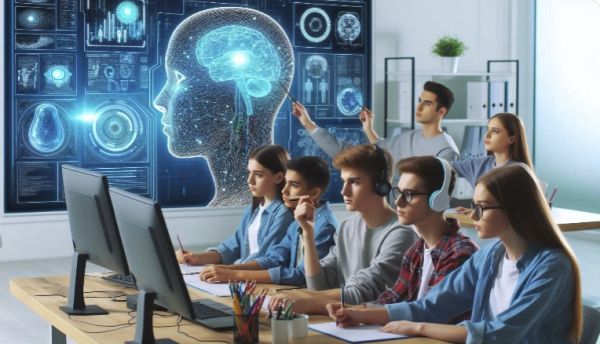
How AI is impacting education and job prospects for students

Artificial Intelligence (AI) is rapidly transforming various sectors of our world today, and education is no exception. Its growing influence is reshaping the way we learn and work. As AI continues to advance, understanding its impact on education and future career prospects becomes increasingly crucial.
For students and job seekers, this knowledge can be the key to unlocking new opportunities and staying ahead in a competitive job market.
AI’s Impact on Education
For Students: AI is revolutionizing the learning experience for students in numerous ways.
Personalized Learning
One of the most significant benefits of AI in education is personalized learning. AI-driven platforms can tailor educational content to individual students’ needs, preferences, and learning speeds. This ensures that each student receives a unique learning experience that maximizes their potential.
Adaptive Learning Platforms
Generalized AI models like the yet-to-be-released ChatGPT 4o with vision and voice capabilities are slated to provide real-time feedback and virtual tutoring. AI tools have the ability to adapt to each student’s learning style, making education more interactive and engaging. Currently, many online learning platforms such as Coursera and Khan Academy incorporate AI tools (Coursera Coach, Khanmigo) into their learning environments.
Automated Grading and Feedback
AI can streamline the grading process by automatically assessing assignments and providing instant feedback. This not only saves time for educators but also allows students to learn from their mistakes more quickly and improve their performance.
Opportunities for Students with Disabilities
AI technologies are creating better learning opportunities for students with disabilities. From speech-to-text applications to AI-powered reading tools, these advancements make education more accessible and inclusive.
Language Translation and ESL Support
For ESL (English as a Second Language) learners, AI-driven translation and language support tools are invaluable. They help bridge language barriers, making it easier for students from diverse linguistic backgrounds to grasp new concepts and excel academically.
For Teachers: AI is not just set to transform the student experience; it will also revolutionize the ways teachers work.
Automated Administrative Tasks
AI can handle repetitive administrative tasks like enrollment, grading, and scheduling. This reduces the administrative workload for teachers, allowing them to focus more on teaching and student interaction.
Data-Driven Decision Making
With predictive analytics, AI can analyze student performance data to identify trends and patterns. This helps educators make informed decisions, identify at-risk students early, and implement targeted interventions to support their success.
~~~
Changing Job Landscape
AI is also reshaping the job market, creating new opportunities and challenges:
Emerging AI-Related Careers
Growth in AI Development and Engineering Roles
The demand for AI developers, machine learning engineers, and data scientists is skyrocketing. These roles are crucial in designing, building, and maintaining AI systems that drive innovation across various industries.
Expansion in Data Science and Analytics Fields
Data is the new oil, and those who can analyze and interpret data are in high demand. Careers in data science and analytics are growing as organizations seek to leverage data for strategic decision-making.
Need for AI Literacy in Every Sector
As AI permeates various industries, AI literacy becomes essential for all professionals. Understanding AI basics, its applications, and its impact on different sectors is crucial for staying relevant and competitive in the job market.
~~~
Preparing Students for an AI-Driven Future
Lifelong Learning Mindset
In an AI-driven world, the importance of lifelong learning cannot be overstated. Embracing new technologies and continuously updating skills is key to staying ahead. However, AI should be seen as a tool to work faster, smarter, and better, and not as something to fear or ignore.
Emphasis on STEM Education
Encouraging students to pursue Science, Technology, Engineering, and Mathematics (STEM) education is vital. Understanding coding, machine learning, and data analysis provides a strong foundation for careers in AI and related fields.
Fostering Creativity and Critical Thinking
While technical skills are important, creativity and critical thinking are equally essential. AI can handle routine tasks, but human creativity and problem-solving skills drive innovation and adapt to new challenges.
Problem-Solving, Creativity, and Adaptability
In a rapidly changing job market, problem-solving abilities, creativity, and adaptability are invaluable. These skills enable students to navigate the complexities of the AI-driven future and seize new opportunities.
~~~
Challenges and Concerns
While AI brings numerous benefits, it also presents several challenges:
AI-Driven Automation and Job Displacement
Automation powered by AI can lead to job displacement, particularly in traditional roles. Preparing the workforce for new types of jobs and retraining workers for AI-driven roles is crucial to mitigate this impact.
Ethical and Bias Issues
AI tools used in hiring can sometimes exhibit racial biases and lead to unfair or inaccurate candidate selection. Ensuring fairness and transparency in AI algorithms is essential to prevent discrimination.
Digital Divide and Privacy Concerns
The digital divide can widen as AI becomes more integrated into education and the workforce. Ensuring equitable access to AI tools and addressing privacy and data security concerns are critical for inclusive and safe AI adoption.
~~~
Conclusion:
AI is undeniably transforming every sector and profession. From acting where AI is used by actors to read lines and make self-tapes, to sports where AI helps teams such as the NFL’s San Francisco 49ers answer fan queries, or to healthcare where AI assists radiologists in predicting breast cancer by analyzing mammograms, AI’s impact is far-reaching.
In education, AI is revolutionizing learning experiences and job prospects for students. By embracing AI-driven technologies, fostering a lifelong learning mindset, and addressing the associated challenges, we can harness the power of AI to create a brighter, more inclusive future.

###
Posted by Richard Webster, Ace News Today
Follow Richard on Facebook, Twitter & Instagram






